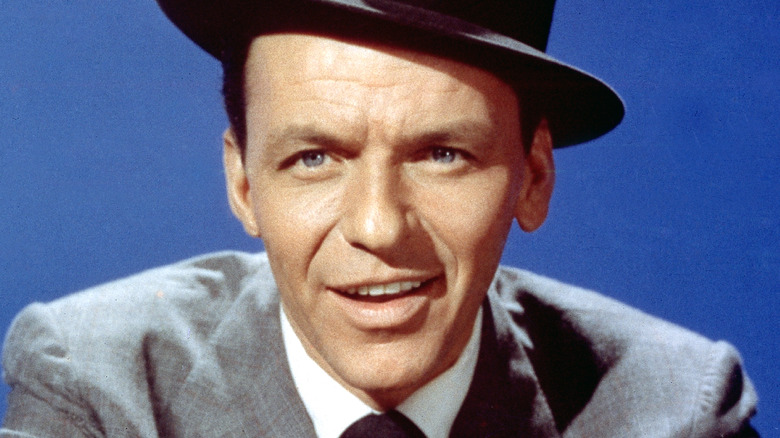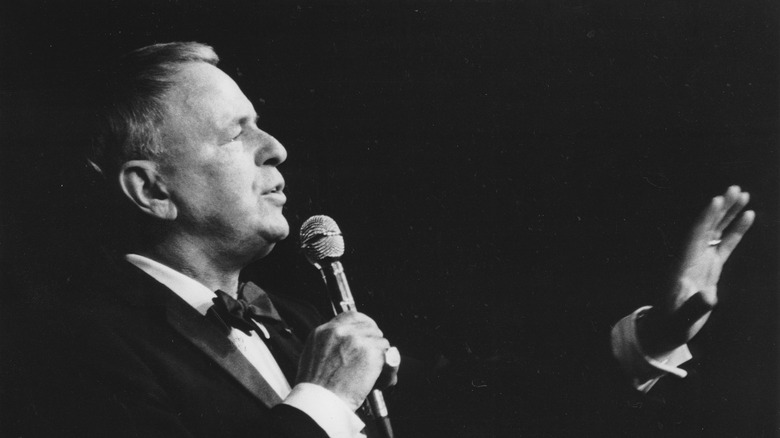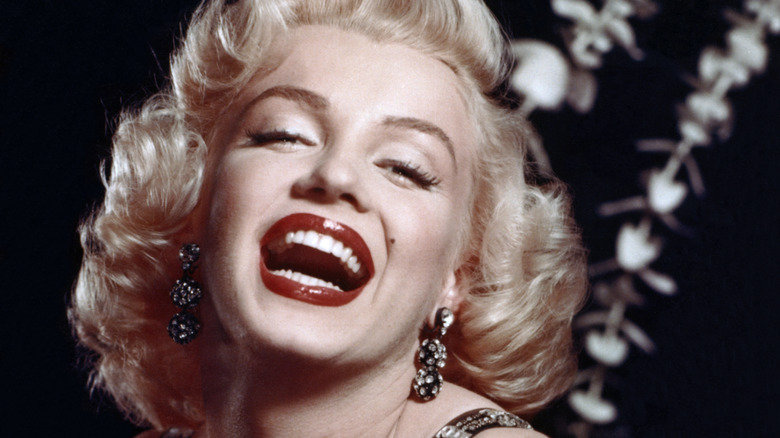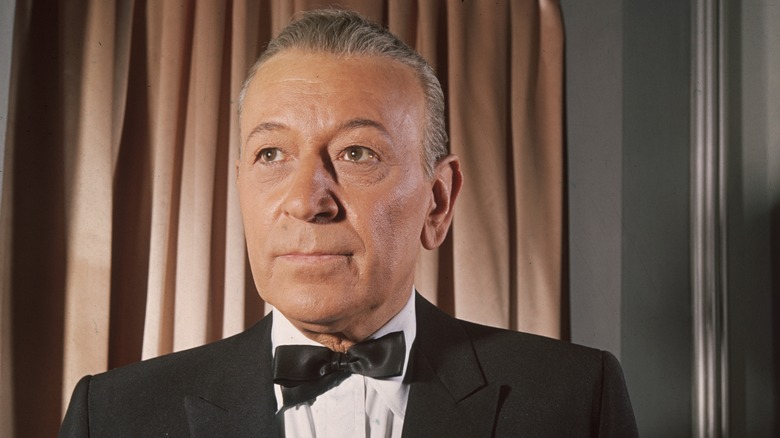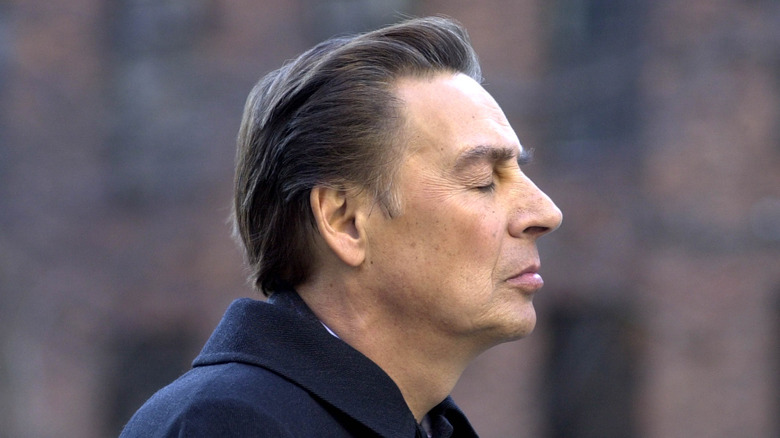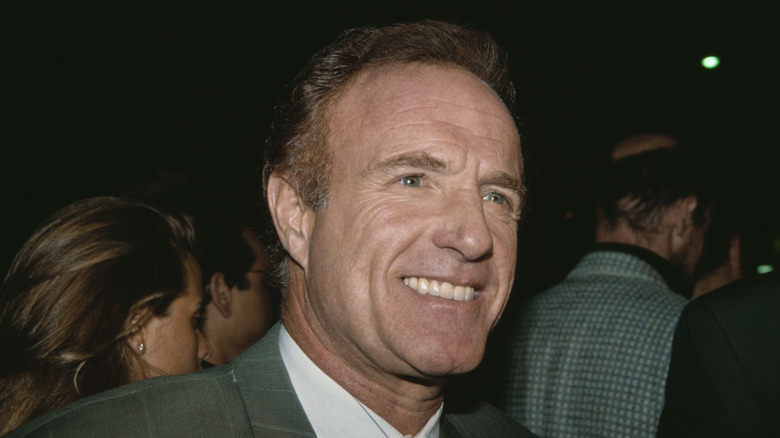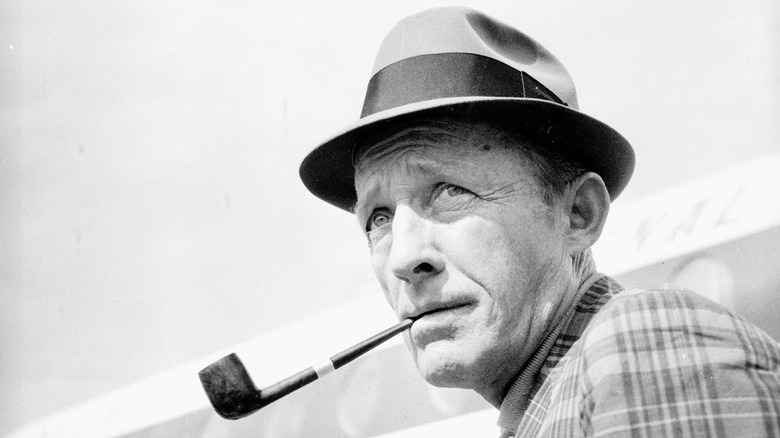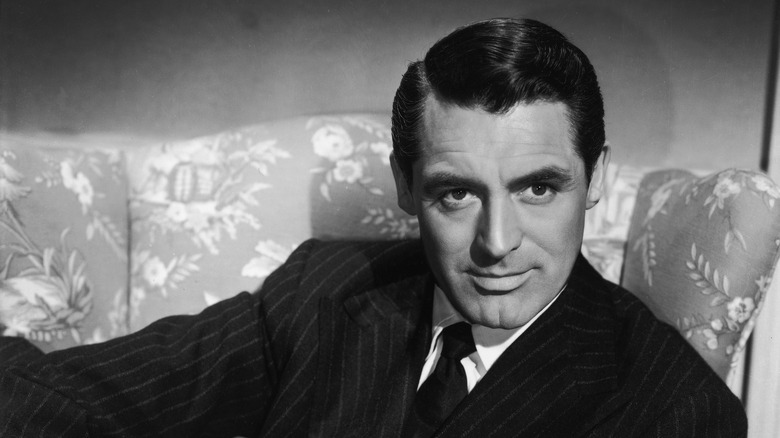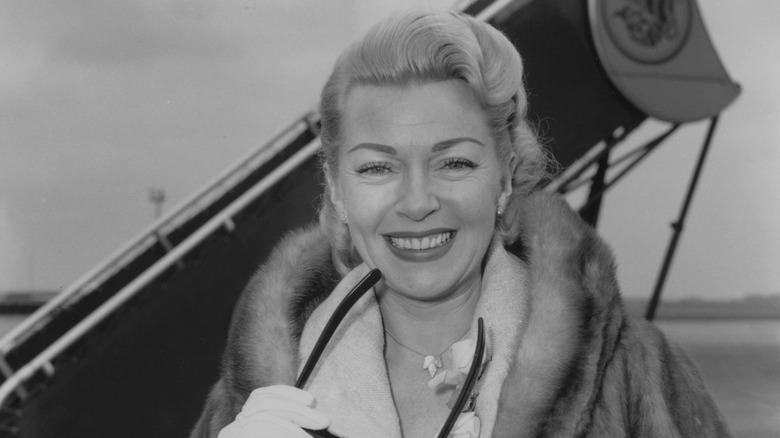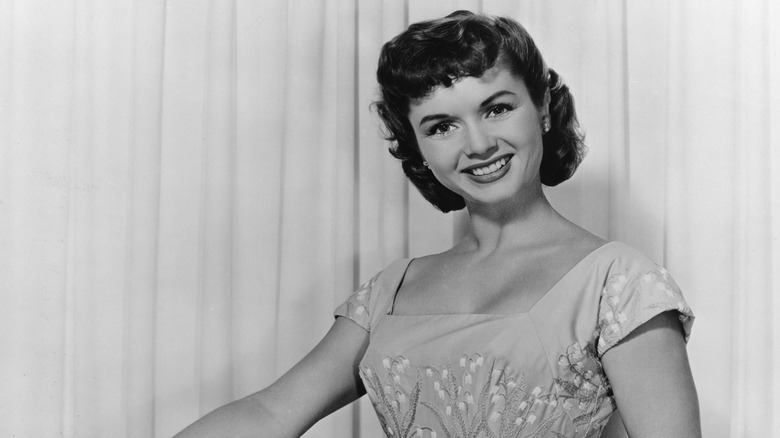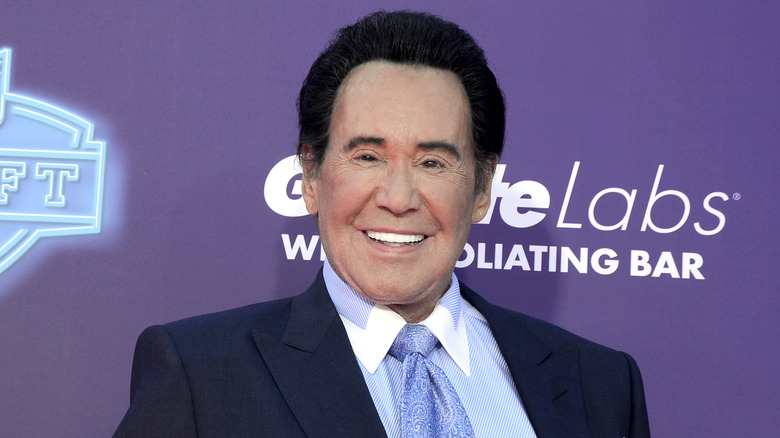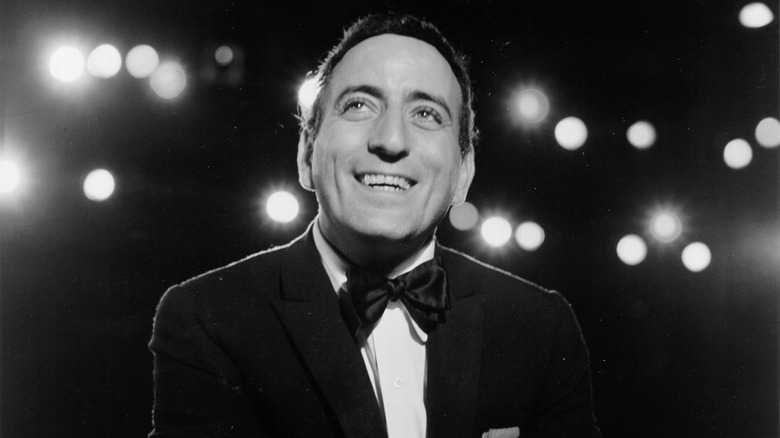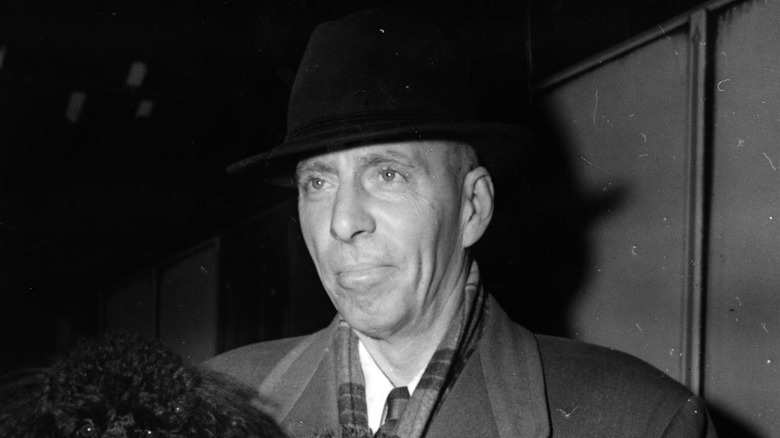Old Hollywood Celebs With Mob Ties
Hollywood and organized crime have had a cozy relationship for almost as long as each institution has existed in the U.S. The film industry has been making the mob look glamorous and cool for decades, and the mob has been using the Dream Factory as a way to launder money, hob-knob with celebrities, and control unions for just as long.
But it's one thing to note that an industry has mob connections — any business where money is made is going to attract the attention of career criminals, after all. It's something else to note that individual Hollywood celebrities have ties to organized crime. Celebs have money, fame, and some measure of power — and they have carefully curated public images. Being associated with criminals might not seem like the best way to protect that image, especially in a business where your personal popularity is paramount.
But a surprising number of old-school actors, directors, and singers have been closely associated with the mob in some way. Whether it's old neighborhood connections, a desire to promote a tough-guy persona, or complicated business dealings, there's a long list of surprisingly famous names who have had some connection with the Mafia or other crime syndicate. Here are some of the old Hollywood celebs with mob ties.
Frank Sinatra
Few celebrities have been so closely and publicly linked with organized crime as Frank Sinatra. Speculation that Old Blue Eyes was closely connected to the mob is a big part of the Sinatra legend—and was officially documented by the Federal Bureau of Investigation (FBI), according to History. The FBI documented Sinatra's movements and relationships for decades, and detailed the many, many relationships Sinatra had with well-known mobsters like Sam Giancana, boss of the Chicago Mob. As noted by Den of Geek, Sinatra's mob ties were so well-known the character of Johnny Fontane in "The Godfather," who begs Don Corleone to help him get a film role, is clearly based on Sinatra despite claims to the contrary by the novel's author, Mario Puzo.
Sinatra always denied that he was "connected." As Page Six reports, he often complained that the accusations stemmed from racism, with people assuming he was mobbed up solely because he had an Italian name. He also claimed that any association with mobsters stemmed from the fact that they tended to own the nightclubs where he performed, making it impossible not to associate with them.
As noted by Britannica, today, people assume that whatever association Sinatra had with organized crime was probably involuntary — mobsters wanted to be associated with the star, and he knew there would be consequences to spurning the association, so he went along.
Marilyn Monroe
When we think of Marilyn Monroe, we think of the iconic sex symbol, the tragic beauty eaten alive by fame, and the pressures of Hollywood. But according to CBS News, there are some who think that Monroe may have had deep connections to organized crime — and that she was actually murdered by the mob.
According to Fox Business, actor Gianni Russo, best known for his role as Carlo in "The Godfather," was also a man connected to organized crime — he worked as a messenger for legendary mobster Frank Costello as a young man — and he claimed Monroe had been killed by organized crime figures. He claims that Monroe was used by the mob to get close to President John F. Kennedy and his brother, Robert — and that she was planning to go public with what she knew.
Vanity Fair reports that many people suspect Monroe's apartment was bugged, and that recordings of her meetings with the Kennedys were made. And Monroe is believed to have visited Chicago mob boss Sam Giancana just a few days before she was found dead in her home in 1962. Reportedly Giancana attempted to convince Monroe not to speak out about her affairs with the Kennedys in order to preserve his leverage over the president. While we may never know the full truth, it's clear that Monroe had some connection to organized crime.
George Raft
George Raft was a big star in his time, but as noted by The Rake, he could have been a much bigger name. He made some questionable choices in his career, turning down roles that made other actors famous. But it was one of his earliest roles that made him a star to begin with: Playing Rinaldo in the 1932 classic "Scarface." As noted by author Kevin Starr in his book "Embattled Dreams," Raft's depiction of a coin-flipping mobster was so powerful it inspired actual mobsters to replicate his style and mannerisms.
Raft came by the tough-guy persona honestly. As noted by Paste Magazine, Raft grew up in tough neighborhoods and was real, actual friends with plenty of mobbed-up people. Raft worked for Irish Mob leader Owney Madden in New York City as a youth, and was personal friends with Bugsy Siegel and Meyer Lansky. In fact, Raft was once banned from entering the United Kingdom because of his criminal associations.
There's no indication Raft was ever involved in anything illegal, however — he was just a guy who knew mobsters and could therefore bring a dose of realism to portraying them in films. He did reportedly use his relationship with organized crime figures to help out his friends, allegedly helping to stop planned assassinations of fellow actors James Cagney and Gary Cooper when they angered Mafia figures.
Jerry Orbach
Most people are familiar with Jerry Orbach from his roles in relatively modern productions like "Dirty Dancing" or "Law and Order," but his career goes all the way back to the 1950s. His mob ties date back to 1971.
According to Paste Magazine, it all began when Orbach signed on to play Salvatore "Kid Sally" Palumbo in "The Gang That Couldn't Shoot Straight," a 1971 comedy about incompetent mobsters. The Palumbo character was based on real-life mobster Joe Gallo, a ranking member of the Profaci Family in New York City. Gallo wasn't happy to find out a film mocking him and his gang had been released, and he arranged to meet Orbach. Instead of an angry confrontation, however, the two hit it off and became friends.
The New York Times reports that Gallo was murdered at Umberto's Clam House in Little Italy in April 1972. Orbach and his wife had met with Gallo earlier in the evening, taking in a Don Rickles show — and Orbach is rumored to have joined Gallo for dinner at Umberto's, according to Hollywood.com, making him an eye witness to the killing. Not only did Orbach refuse to cooperate with the police, but he also refused to ever speak about Gallo — and took whatever secrets he held with him to his grave in 2004. The homicide detective in charge of the case, Joseph Coffey, made it clear that the case couldn't be closed because Orbach refused to give up his information.
James Caan
The late James Caan was one of the most beloved and successful actors of his generation. According to a high-profile real-life member of the Mafia, Caan didn't just play mobsters like Sonny Corleone in "The Godfather" — he was a real-life "connected" guy.
The Toronto Sun reports that Sammy "The Bull" Gravano claimed Caan was deeply involved with the Colombo crime family — and was officially an "associate," a rank conferred on non-Italians. According to Gravano, Caan was so deep in with the Colombos that he had to ask Joe Colombo himself for permission to portray Sonny.
There's actually no doubt that Caan was connected with the Colombo crime family in some way. According to The New York Post, Caan publicly admitted that he and Colombo street boss Andrew Russo were close and that their families were "intertwined." Russo was even made godparent of Caan's son Scott. And author Tim Adler reports in his book "Hollywood and the Mob" that Caan often used his connections to organized crime to intimidate enemies — and even tried to strong-arm his way into a role in the film "The Pope of Greenwich Village," sending mob friends to lean on the producer. Most incredibly, according to The Guardian, Caan once hired a mob associated to kill fellow actor Joe Pesci over a debt of $8,000 — though the hit obviously never took place.
Bing Crosby
Bing Crosby's public image was of a clean-cut, affable everyman who happened to have a delightful singing voice. But the truth about one of America's biggest stars — and a voice you still hear every holiday season — was quite different. Far Out Magazine reports that Crosby has been accused of being an abusive father and a heavy drinker, and according to the New York Post, Crosby was a degenerate gambler who sought out illegal games. This often brought him into close contact with members of organized crime.
These associations weren't glamorous. The Guardian reports that Bing once had to pay up $10,000 to a mobster in order to avoid a much worse scenario. And according to the Desert Sun, Crosby himself told the story of getting blackout drunk one night in 1929 and waking up in the company of a group of gangsters. Crosby went to the bathroom to freshen up — just as a rival gang arrived and shot up the room he'd been in a moment before.
Crosby's mob ties were so deep the FBI actually launched an investigation into him. Crosby, an avid golfer, played with some of the most notorious and violent gangsters in America, including Bugsy Siegel. Crosby's gambling put him so deep in debt with the mob he feared for his life — and had to ask his friend Frank Sinatra to help him out.
Cary Grant
Cary Grant remains a symbol of Hollywood elegance. His chiseled good looks and unique diction are still recognizable to younger generations. You might imagine someone who sat on top of the Hollywood food chain for as long as Grant did would have no desire to hob-knob with gangsters, but the opposite is the case.
In fact, organized crime might be the reason Grant became a star in the first place. According to author Tim Adler in his book "Hollywood and the Mob," Chicago crime boss Sam Giancana once boasted that Grant was among a list of Old Hollywood stars that "the Outfit" had helped. The mob would pressure producers to give roles to actors they liked — and then expect that actor to owe them a favor in return.
And HowStuffWorks reports that Grant was one of many Hollywood celebrities who happily partied with famous mobster Bugsy Siegel. Den of Geek notes that Grant didn't meet his mobsters friends through any sort of unsavory behavior. He met them through fellow actor George Raft, who'd grown up with gangsters and was deeply connected to the underworld. Grant became part of Siegel's circle of friends, and played poker with the gangster regularly. When Siegel died in 1947, Grant joined almost all of the gangster's Hollywood pals in not attending the funeral.
Lana Turner
Lana Turner was one of the biggest stars in Hollywood for decades. Her personal life was always tumultuous — according to the Los Angeles Times, she married seven times, and she was rumored to have had affairs with many of Hollywood's leading men.
It was her relationship with mobster Johnny Stompanato that established her mob ties. Stompanato had ties to mob boss Mickey Cohen and was a violent and unpredictable man. When Turner tried to end the affair due to his possessiveness and frightening fits of anger, Stompanato threatened her with a razor. Author Tim Adler notes in his book "Hollywood and the Mob" that Stompanato warned Turner that she would face reprisals from the mob if anything ever happened to him.
Time notes it all came to a head on April 4, 1958. Stompanato and Turner got into a loud, violent argument that culminated with Stompanato's death by stabbing. Turner told police her young daughter, Cheryl Crane, had rushed into the room to stab Stompanato in order to protect her, and the killing was ruled a justifiable homicide. But some suspect to this day that Turner was the killer — and one of Stompanato's friends theorized that Cheryl was in love with the older man, and the death was the result of a twisted love triangle between mother and daughter.
Debbie Reynolds
When it comes to old-school Hollywood's mob ties, possibly the last celebrity you'd think of would be Debbie Reynolds. But Reynolds had some complex dealings with the mob — whether she knew it or not.
Vanity Fair notes that Reynolds' second husband, Harry Karl of the Karl's Shoe empire, had been briefly married to Joan Cohn, widow of former Columbia Pictures honcho Harry Cohn. The marriage lasted just a few weeks, and law enforcement theorized it had been arranged by the mob in order to recoup shady investments that Cohn had fronted for them through the studio. The idea was that Karl, as Joan's husband, would control Cohn's estate and be able to pay everyone back without leaving an obvious trail.
In 1960, the same year that Karl married Reynolds, Karl's Shoes transferred ownership of a home to Sidney Korshak, a notorious and powerful attorney in the world of organized crime. Shortly afterward, Korshak made Reynolds a wealthy woman by negotiating a huge payout for her when she made her Las Vegas performing debut. The Mob Museum notes that a few years later, Reynolds and her production company entered a deal to create Scopitone films — essentially early music videos played in a jukebox-like device. The whole business was a front for organized crime, eventually investigated by the FBI and went out of business in 1969. While it seems like Reynolds was unaware of the connections, it's a curious series of coincidences.
Wayne Newton
Wayne Newton's public image is pretty squeaky-clean. The man became a symbol of Las Vegas when the city had revamped itself to become a more family-friendly leisure destination — so when rumors about his connections to organized crime surfaced in the early 21st century, it was bad for business.
As reported by The Las Vegas Sun, it all came down to gaming licenses: As anyone who has seen "The Godfather Part II" knows, you can't have a gaming license if you've got a criminal record. When Newton became part owner of The Aladdin casino, rumors flew that he was a front for the mob. According to the Las Vegas Review-Journal, these rumors stemmed from Newton's relationship with Guido Penosi, a well-known figure in organized crime. Newton admitted to the friendship—but insisted he had no idea Penosi was connected.
AP News reports that Newton filed a lawsuit against NBC for airing the initial report, and claimed that he feared for his life because the rumors made it sound like he might be cooperating with the authorities against the mob. Newton was awarded $19 million in damages by a jury, but an appeals court ruled that since there was no malice in NBC's reporting, there could be no damages. Curiously, the Los Angeles Times reports that during the trial, a Nevada gaming official testified that they were very concerned about Newton's relationship with Penosi — and that he believed Newton was lying about the nature of their relationship.
Tony Bennett
As noted by JazzTimes, legendary crooner Tony Bennett has readily admitted that — like Frank Sinatra and other singers who came up in the same era — as a professional singer, he couldn't avoid organized crime entirely. All the clubs he performed in were owned in some sense by the mob, and they were deeply involved in the music industry as a whole. According to the New York Daily News, Bennett's biographer David Evanier claimed Bennett got started in his career with the help of mob money and was an associate of organized crime for years.
But Bennett managed to get himself more intimately connected with organized crime — and it almost went very badly for him. The late 1970s and early 1980s were very dark times for Bennett, who had become a heavy drug user and extremely depressed. The drugs might explain why Bennett would start seeing a girl who was known to be the girlfriend of wiseguy Anthony Spilotro. To put this in perspective, the Las Vegas Review-Journal reports that Spilotro was the inspiration for the violent, unstable mobster played by Joe Pesci in the film "Casino."
All things considered, Bennett got off easy: Spilotro confronted Bennett and hit him on the head with a phone book hard enough to knock the singer unconscious. But that might have knocked some sense into Bennett, who checked into rehab shortly afterwards.
Howard Hawks
As noted by the encyclopedia Britannica, Howard Hawks is regarded as a legendary Old Hollywood director, an artist whose style is instantly recognizable. His films were consistently successful, which is remarkable considering his career spanned the 1920s through the 1970s.
Hawks' most famous film remains 1932's "Scarface," still regarded as one of the best gangster films ever made. One reason for the film's success might be the extremely personal guidance Hawks received from the film's inspiration, notorious gangster Al Capone. Author Tim Adler explains in his book "Hollywood and the Mob" that when production began on the film, Hawks noticed a man named George White on his set—who turned out to be Puggy White, one of Capone's men. White began advising Hawks on how to make the film realistic — and this eventually led to Capone himself showing up to review scenes and offer advice.
The Guardian reports that Capone and Hawks became friendly — Capone even demonstrated the proper use of the Tommy gun for the director. According to author Donald Jeffries in the book "On Borrowed Fame," Capone was so pleased with the film he threw Hawks a lavish party when the director visited Chicago and gave him a miniature machine gun as a gift.
